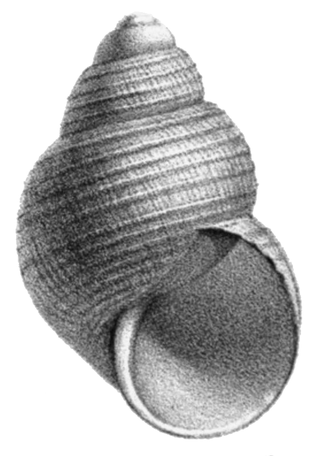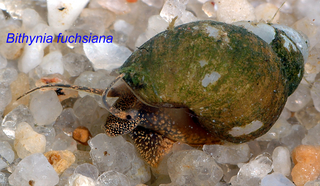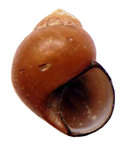
Clonorchis sinensis, the Chinese liver fluke, is a liver fluke belonging to the class Trematoda, phylum Platyhelminthes. It infects fish-eating mammals, including humans. In humans, it infects the common bile duct and gall bladder, feeding on bile. It was discovered by British physician James McConnell at the Medical College Hospital in Calcutta (Kolkata) in 1874. The first description was given by Thomas Spencer Cobbold, who named it Distoma sinense. The fluke passes its lifecycle in three different hosts, namely freshwater snail as first intermediate hosts, freshwater fish as second intermediate host, and mammals as definitive hosts.

Opisthorchis felineus, the Siberian liver fluke or cat liver fluke, is a trematode parasite that infects the liver in mammals. It was first discovered in 1884 in a cat's liver by Sebastiano Rivolta of Italy. In 1891, Russian parasitologist, Konstantin Nikolaevich Vinogradov (1847–1906) found it in a human, and named the parasite a "Siberian liver fluke". In the 1930s, helminthologist Hans Vogel of Hamburg published an article describing the life cycle of Opisthorchis felineus. Felineus infections may also involve the pancreatic ducts. Diagnosis of Opisthorchis infection is based on microscopic identification of parasite eggs in stool specimens. Safe and effective medication is available to treat Opisthorchis infections. Adequately freezing or cooking fish will kill the parasite.

Bithynia tentaculata, common names the mud bithynia or common bithynia, or faucet snail is a relatively small species of freshwater snail with gills and an operculum, an aquatic prosobranch gastropod mollusk in the family Bithyniidae.

Bithynia leachii is species of small freshwater snail with an operculum, an aquatic prosobranch gastropod mollusk in the family Bithyniidae.

Bithynia is a genus of small freshwater snails with an operculum, aquatic prosobranch gastropod mollusks in the family Bithyniidae.

Lamprocystis misella is a species of small air-breathing land snails, terrestrial pulmonate gastropod mollusks in the family Euconulidae, the hive snails.

Parafossarulus manchouricus is a species of freshwater snail with gills and an operculum, an aquatic prosobranch gastropod mollusk in the family Bithyniidae.

Bithynia siamensis is a species of a freshwater snail with a gill and an operculum, an aquatic prosobranch gastropod mollusk in the family Bithyniidae.

Bithynia fuchsiana is a species of small freshwater snail with a gill and an operculum. It an aquatic gastropod mollusk in the family Bithyniidae.
Bithynia longicornis is a species of freshwater snail with a gill and an operculum, an aquatic gastropod mollusk in the family Bithyniidae.

Bithynia funiculata is a species of freshwater snail with a gill and an operculum, an aquatic gastropod mollusk in the family Bithyniidae.

Gabbia is a genus of a freshwater snails with an operculum, aquatic prosobranch gastropod mollusks in the family Bithyniidae.

Bithynia pygmaea is a species of freshwater snail with a gill and an operculum, an aquatic gastropod mollusk in the family Bithyniidae. It may be threatened by damming of Mekong and water pollution from industrialisation.
Parafossarulus spiridonovi is a species of freshwater snail with gills and an operculum, an aquatic prosobranch gastropod mollusk in the family Bithyniidae.
Parafossarulus striatulus is a species of freshwater snail with gills and an operculum, an aquatic prosobranch gastropod mollusk in the family Bithyniidae.
Acanthatrium hitaensis is a species of a trematode, or fluke worm, in the family Lecithodendriidae.
Prosthogonimus ovatus is a species of a trematodes, or fluke worms, in the family Prosthogonimidae.
Parafossarulus anomalospiralis is a species of freshwater snail with gills and an operculum, an aquatic prosobranch gastropod mollusk in the family Bithyniidae.











